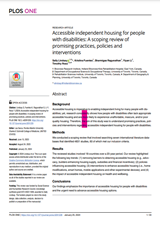Accessible independent housing for people with disabilities: A scoping review

Accessible housing is imperative to enabling independent living for many people with disabilities but they often lack appropriate accessible housing and are more likely to experience unaffordable, insecure or poor quality housing. The aim of this scoping review was to understand promising practices, policies and interventions regarding accessible independent housing for people with disabilities.
The reviewed studies involved 18 countries over a 20-year period and the publication highlights key trends, including:
- Removing barriers to obtaining accessible housing (e.g. advocacy, builders enhacing housing supply, subsidies and financial incentives)
- Policies influencing accessible housing
- Interventions to enhance accessible housing, including modifcations and technology
- The impact of accessible independent housing on health and wellbeing
The conculsions in this review suggest that there are potential promising practices, policies and interventions to enhance accessible housing through home modifications, smart homes, mobile applications, and experimental devices to enhance the quality of life of people with disabilities. The research finds a critical need to continue to advocate and find accessible housing solutions for people with disabilities and that future research should consider focusing on marginalised and minoritised groups who may be more vulnerable to securing accessible housing.
